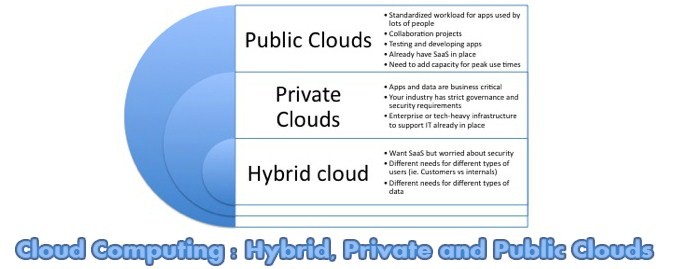Cloud Computing: Hybrid, Private and Public Clouds
 Know the three types of Cloud Computing and the main characteristics of each one.
Know the three types of Cloud Computing and the main characteristics of each one.
Currently, the importance of Cloud Computing around the world is undeniable. The attention that the topic has received at conventions, fairs technology, among others, shows that this business model is here to stay.
In cloud computing, there are three types of organization for service delivery, infrastructure, data storage, and software platforms: Private Cloud, Public Cloud and Hybrid Cloud. They all follow a basic principle which is to promote the virtual work environment based on the collaborative aspect of technology.
PUBLIC CLOUD
The model of Public Cloud is a service provided by a supplier to ordinary users or businesses via the Internet. This service provider is responsible for protecting, hosting, maintenance and data management in a company or for client, charging only for the resources used, whether application infrastructure, physical infrastructure or software.
This service is shared with other companies or users. With this, the company has full control over what does and records in the cloud, but not on the actions of others in the environment. You can use this service effectively, however, your company may face potential safety problems due to the public nature of this Cloud.
It is a model that has as one of its benefits to reduce costs and thus is a good alternative for companies with a limited budget or other priorities. However, if your company works with a large volume of confidential data, this may not be the best solution. The Public Cloud is suitable for small and medium-sized businesses working with less sensitive data.
PRIVATE CLOUD
Private clouds are cloud services provided within a company and they offer all the basic functions of Cloud Computing such as increased productivity, flexibility and scalability, remote access, among others, but with restricted access to only one company or a specific group without IT resource sharing with other companies or users outside the corporate environment. In this format, the very company that integrates all departments and areas with the Cloud Computing model, with the installation and maintenance of infrastructure and the platform for the company that provides the Private Cloud system.
With this, the private cloud using an intelligent and flexible network that provides an experience of reliable use, enabling storage and access to information and corporate data safely. Companies that operate in highly regulated sectors or working with sensitive information, such concerns have that need to be met. Choosing a private cloud can be the right option in this case because its main purpose is just to provide more stability for the storage of corporate data in the cloud, ensuring total control over the environment with less risk of threats from third parties, and providing access wherever the employee is.
Another advantage of a private cloud is high customization capabilities, it is possible to increase the efficiency of servers and data centers, reducing deployment costs and increasing the company’s productivity and streamlining operations and infrastructure. However, the price of deploying an internal cloud can be a hindrance for some small and medium businesses.
HYBRID CLOUD
The hybrid cloud model allows keeping systems in private and other public cloud simultaneously. For example, critical systems that handle sensitive information or can be hosted internally while other systems that do not deal with sensitive data, can be used on a public network.
A well-built hybrid cloud can meet safe processes that need more care because the private cloud ensures safety through an exclusive network installed in the company. A hybrid cloud can also meet the demands of scalability, for example, when a company needs the extra capacity of a server only during a busy period in particular, and soon after to no longer use most. Hybrid cloud can more easily meet its irregular demand, due to its dynamic scalability.
This format of cloud allows a company to establish the best training for the business model as it enhances the internal control of applications for the business needs, analyzing what is the best option. Due to new technological and economic realities, the hybrid cloud model has been the most used in the corporate market.
Resources:
- https://www.esds.co.in/enlight-cloud-hosting.php
- https://www.esds.co.in/private-cloud-hosting.php
- https://www.esds.co.in/hybrid-cloud-hosting.php
- https://www.esds.co.in/cloud-orchestration.php
- How Cloud Computing Is Changing The Labor Market - March 25, 2015
- Adopting Infrastructure as a Service Can be a Good Deal - March 17, 2015
- Will Virtualize? Take These Six Points Into Consideration - March 12, 2015
Thanks for this nice post.. i learned what is cloud computing. Thanks a lot…!